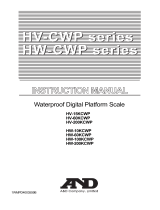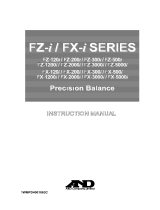Page is loading ...

4 1
• Print switch mode / Command mode Function setting “ prt 2 ”
When the
PRINT switch is pressed while the weight value is stable (STABLE indicator is on), the
scale transmits the value.
• Auto-print mode +/- data / Command mode Function setting “ prt 3 ”
The scale transmits the weight value when the display is stable (STABLE indicator is on) and the value
is more than +4d or less than -4d. The next output can be obtained after the value returns to be more
than -4d and less than +4d.
d = minimum display (Refer to “Specifications” of the scale instruction manual.)
Even the counting mode uses “d” for judgment.
• Auto-print mode + data / Command mode Function setting “ prt 4 ”
The scale transmits the weight value when the display is stable (STABLE indicator is on) and the value
is more than +4d. The next output can be obtained after the value returns to be less than +4d.
d = minimum display (Refer to “Specifications” of the scale instruction manual.)
Even the counting mode uses “d” for judgment.
3.4. Command mode
In the command mode, the scale is controlled by commands that come from the external device such
as a personal computer.
Command list
• “ Q ” command Command to request the current weight value.
Command Q C
R
L
F
Reply S T , + 0 0 1 2 3
.
4
5
_
k
g C
R
L
F
• “ Z ” command Same operation as the
ZERO switch.
Command Z C
R
L
F
• “ T ” command Same operation as the
TARE switch.
Command T C
R
L
F
Reply to the command
• When the command cannot be executed, for example, because the scale is unstable, “ I ” will be sent.
Reply I C
R
L
F
• If the received command is not for the SC/SE series scale, the scale will send “ ? ”.
Reply ? C
R
L
F
• When “aC k 0” is selected, there is no reply except the “ Q ” command.
SCE-03 RS-232C Serial Interface and
Comparator Relay Output
Instruction Manual
1WMPD4002182A
1. Features
• This interface allows the scale to be connected to a printer or a personal computer.
• It also allows outputting the comparison results of
HI
,
OK
or
LO
obtained using the comparator
function as a relay signal.
Note: SCE-02 and SCE-03 can not be installed at the same time.
2. Installation Procedure
Note: Before installing the SCE-03 board, be sure to remove
the batteries from the scale.
Step 1
Pass the cable to connect an external device through the hole
on the casing and connect it to the terminal block on the
interface board.
Step 2
Insert the interface board into the casing.
Step 3
Place the waterproof packing on the casing, aligning its holes
with the casing screw holes.
Step 4
Remove the four screws on the option slot panel located on
the bottom of the display.
Step 5
Insert the interface board into the option slot.
Step 6
Secure the casing to the display, using the four screws
provided with the casing.
Step 7
Seal the screw heads with the tabs attached to the waterproof
packing.
• Cable connection using optional cables (sold separately)
When connecting to an external device with hardware flow
control, communication will be impossible using a cable
without RTS and CTS connected. In that case, connect RTS
and CTS. This will disable hardware flow control, but enable
communication.
• When the AX-KO3285-320 cable is used, RTS and CTS are
internally connected and the above operation id unnecessary.
• When the connector of an external device is a D-sub 9-pin
connector, pin 7 is RTS and pin 8 is CTS.
AX-KO3285-320
3-23-14 Higashi-Ikebukuro, Toshima-ku, Tokyo 170-0013 JAPAN
Telephone: [81] (3) 5391-6132 Fax: [81] (3) 5391-6148
Cable (AWG 26~16) to
connect an external device
Waterproof packing
Seal the screw heads
Casing
Screws on the
option slot
6 mm (AWG 26~16)
Terminal block
FG
SG
DS
R
TXD
RXD
COM
LO
O
K
HI
The hole for
the cable
Interface board
Cable (AWG 26~16) to
connect an external device
The hole for
the cable
1. Brown (DCD)
2. Red (RXD)
3. Black (TXD)
4. Yellow (DTR)
5. Green (SG)
6. Blue (DSR)
Shield
RXD
TXD
DSR
SG
FG
SCE-03
Terminal block J1
Optional cable unit to
connect with a PC (3 m)

2 3
5 Frame ground FG
4 Signal ground SG
3 Data set ready DSR
2 Transmit data TXD
1 Receive data RXD
Terminal block J1
4 Relay output common COM
3 Relay output LO
2 Relay output OK
1 Relay output HI
Terminal block J2
D-Sub 9 Pin Connector
D-Sub 9 pin Connector Connections SEC-03, Terminal block J1
Pin Signal name Pin Signal name
1 DCD
2 RxD 2 TxD
3 TxD 1 RxD
4 DTR
5 SG 4 SG
6 DSR 3 DSR
7 RTS
8 CTS
Shorted
9 -
Blank heat shrink tubing covered wire 5 FG
AX-KO3341-320
3. SCE-03 RS-232C Serial Interface
• The RS-232C serial interface has four output modes; Stream mode, Command mode, Print switch
mode and Auto-print mode. For details, refer to “3.3. Data output mode”.
• Set the parameters of the functions “ bp5 ”, “ prt ” and “ aCk ” as necessary.
3.1. Interface specifications
• Data format Baud rate: 2400, 4800, 9600 bps
Data bits: 7 bits + parity 1 bit (even)
Start bit: 1 bit
Stop bit: 1 bit
Code: ACII
Terminator: C
R
L
F
(C
R
: 0Dh, L
F
: 0Ah)
LSB
0
1
2
3
4
5
MSB
6
• Relay output maximum rating
Maximum voltage: 50V DC
Maximum current: 100mA DC
Maximum ON resistance: 8Ω
3.2. Data format
S
T
,
+
0
0
0
0
0
.
0
0
_ k g C
R
L
F
• Four types of headers are available:
ST : Stable weight data US : Unstable weight data (including counting data)
QT : Stable counting data OL : Out of weighing range
• The data is always 9 digits including a sign and a decimal point.
• Four units are available:
_kg : Weight data in “kilograms” (kg) _lb : Weight data in “decimal pounds” (lb)
_PC : Counting data in “pieces” (pcs) _oz : Weight data in “decimal ounces” (oz)
• The terminator is always C
R
L
F
.
• Example of output data:
Weight data “kg” S
T
,
+
0 0 1 2 3 . 4 5 _ k g C
R
L
F
Counting data “pcs” Q
T
,
+
0 0 0 1 2 3 4 5 _ P C C
R
L
F
Out of weighing range “kg” (+) O
L
,
+
9 9 9 9 9 . 9 9 _ k g C
R
L
F
Out of weighing range “pcs” (-) O
L
,
- 9 9 9 9 9 9 9 9 _ P C C
R
L
F
3.3. Data output mode
• Stream mode / Command mode Function setting “ prt 0 ”
The scale outputs the current display data in sync with the display update of approximately 10 times per
second. The scale does not output data while it is in the setting mode.
• Command mode only Function setting “ prt 1 ”
The scale replies only to a command. For details, refer to “3.4. Command mode”.
1 (-15V~-5V)
0 (5V~15V)
Stop bi
t
Parity bit
Data bits
Start bit
Header
Data
Unit
Terminator
Separator
Note: “_” indicates a space.
1.Brown
2.Red
3.Orange
4.Yellow
5.Green
6.Blue
7.Purple
8.Gray
9.White
10.Black
RXD
TXD
DSR
SG
FG
SCE-03
Terminal block J1
Optional cable unit
to connect with
AD-8121B printer (3 m)
/








